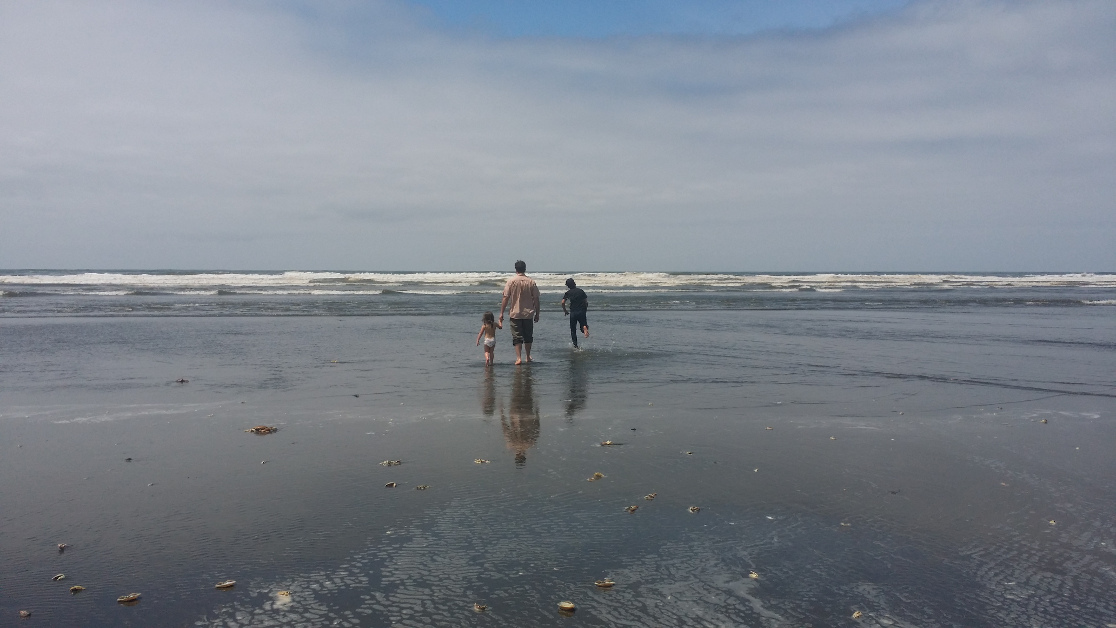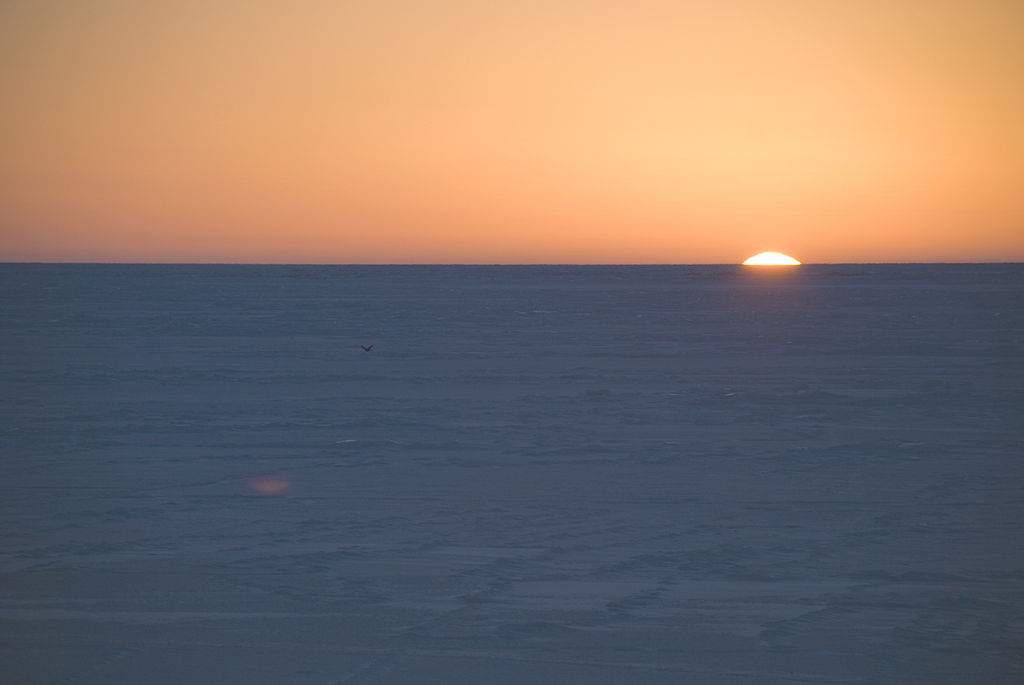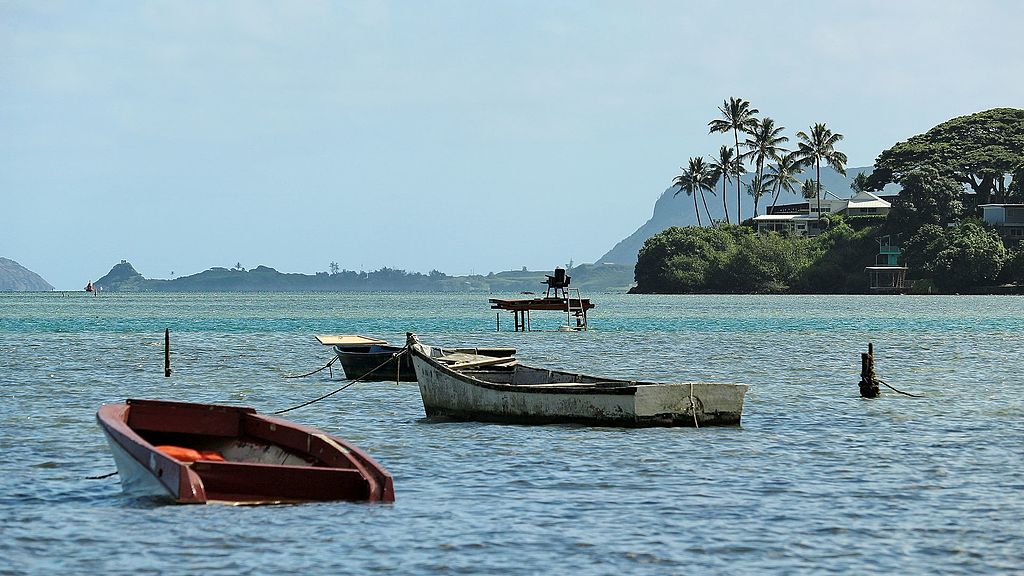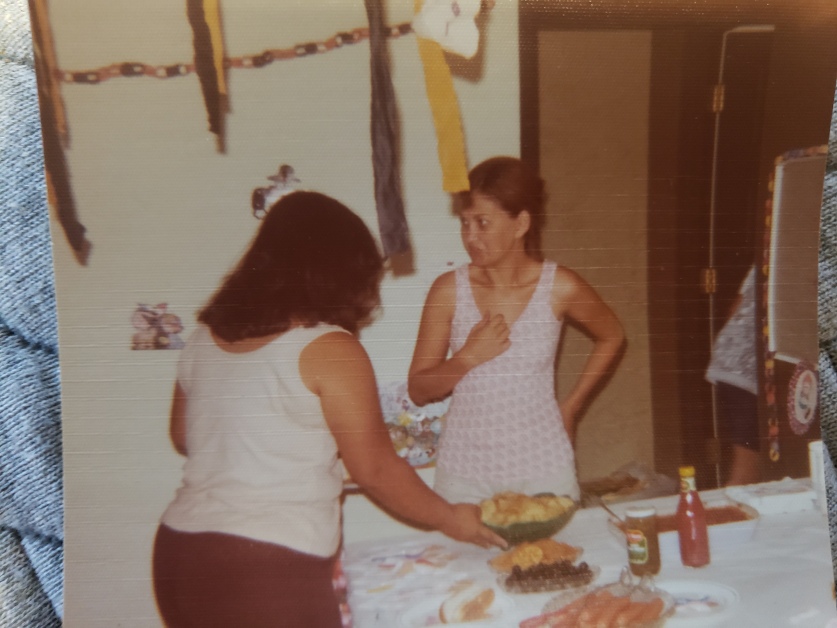It’s a long way from the dunes to the shore and I laugh at the weepy anticipation that grows with each step. I walk alone towards the rolling white froth, smiling at jokes my cousins and I used to share in the lobby of the Hawaiian Regent. We’d huddle in corners, dipping our fingers into plastic packages of Yick Lung and cackling about tourists and their leavings of artificial coconut scented suntan lotion. You didn’t ever need to buy any of your own, we said. All you needed to do was roll around in the Waikīkī sand and be covered in oil left by a thousand different haoles.
The hard, gray, beach of Ocean Shores is an entirely different environment. Nobody is lolling about here in a sun-drunk stupor. We wear jackets and lean into the breeze that rushes in from the wide, silver horizon. I have to push my way towards the ocean and when the wind stalls for a moment I catch myself from falling, then trudge on again.
I stop short, repulsed by thick green sludge and gurgling brown froth. Sea snot, I grump. Picking my way through wayward crab legs, I remind myself it’s unfair to compare this coastline to the hot shores of my Hawaiian islands. I laugh, acknowledging that I am nostalgic for a beach rife with the stinging tentacles of dying Portuguese Man-o’-War.
I plant my feet in a vee of sand that seems drier than the rest and let the ocean take the last few steps in our reunion journey. Her salted fingers curl around my feet and I wince. The water is not exactly icy, but the cold is shocking. I reach down to touch the ocean for the first time in a decade.
“I’ve missed you so much,” I whisper, though I’ve never before stood on this shore.
This is a different ocean than the one I know. This Pacific – the Northwest’s Pacific – is cold and slightly ominous. It stinks a different stink than my tropical Pacific. Its sand is a fine, gray grit that leads to a thick slurry; not the crunching white cradle that held me as a child.
I crave Kailua, Lāʻie, Waimānalo. Even, and maybe especially, the greasy sands of Waikīkī. Young, hot days filled with dumping sand from the crotch of my bathing suit. Sleeping beneath the oscillating breeze of my grandmother’s dusty fan after she slathered my sunburned shoulders with Noxema.
I try to shake myself of this maudlin reverie, but it’s no good. Tears well behind my sunglasses. They slip down my cheeks and I snuffle; consider blowing my nose into the hemline of my dress. Because I am classy. Also, I am my grandmother’s moʻopuna.
I watch my son wade through white frothing waves, grateful he hasn’t noticed me standing on the shore. Even more grateful that he’s not venturing past knee-deep water. He’s so far out already and I’m not a strong swimmer or a fast runner. If he slips, if he flounders, I’m not sure what I could do.
I hear the rev of an engine and turn. There are cars driving on the gray flats, on an ocean highway of sorts just yards from the shore. I wave to my husband, who is holding tight to our daughter’s hand as she pulls him towards the water. He stops her to let a truck pass, then they run wildly the rest of the way.
“I shouldn’t have to worry about my children drowning and getting hit by a car at the exact same moment,” I complain to Ian when he gets close enough to hear me over the shush of low rolling waves. He smiles, but squeezes my hand. He knows that while I do worry about the kids getting hurt, I’m actually having a much more complicated moment.
Iliana tosses her bucket of beach toys onto the wet sand and begins to dig. Ian puts his arm around me and I lean into him, warming myself against the wind rushing past my ears. Knees deep in the surf, Jonas finally looks back and sees us standing at the shore, a huddled collection. He waves, and I return the gesture.
“Brother is waving,” I tell Iliana. At first she shrugs, intent on burying a brown plastic horse in the heavy gray sludge. She plants little flags around it and pats it with a tiny green shovel. Then suddenly she charges towards the water, abandoning the toys buried at my feet. Ian glances at me as he jogs after her, shaking a thumbs-up as a question. Are you okay? he is asking. I nod. Mostly, it’s the truth.
He springs after our girl, yelling words of caution she’s too excited to heed. He catches her hand and I release a breath. Together they play in the unending surf while I content myself with mere observation. I hang back, pretending to keep an eye on our stuff. Really, I’m refusing. I reject this beach with its baffling traffic patterns and too-cold water.
My husband does all of the Good Dad Things with Iliana, who is seeing the ocean for the very first time. He shows her how to jump over the foaming sea; spins her around so her toes cut through the water. Jonas, the impossibly cool older brother, takes a turn spinning her over the waves. I hear their mingled laughter over the rumbling ocean. I laugh in return. Like, honestly, from my belly, laugh.
The Pacific laps at my toes, lifting my daughter’s digging equipment from their little roost. I move our collection of shoes and plastic sand toys farther up the shore. I move them again but the tide keeps following, pulling water here from all of the elsewheres it used to be.
I think of a thousand island beaches kissed by this same temperamental ocean. Of wanting so desperately to get off the rock as a teenager, only to wind up even more desperate to return. It’s been ten years since I’ve been home; twenty since I moved away. So much has changed. How much of home has stayed the same?
I know that my childhood Hawaiʻi is different from today’s Hawaiʻi. From any Hawaiʻi I am lucky enough to share with my children. And really, the Hawaiʻi, the Waikīkī beach my grandmother so gladly shared with me was a lifetime away from the beach she knew as a barefoot girl in Kapahulu. If she ever stood at her childhood seashore in self-absorbed lamentation while I made sand castles at her feet, I never knew it. To me, that travel poster beach was a familiar, personal gift.
I watch my children play on a beach that is theirs, at least for the afternoon. We are the tourists on somebody else’s homeland. I wonder who might have felt a similar strangeness while gazing at my childhood ocean. Who ached for home in the face of the glinting sunrise over my Kāneʻohe bay. Who, like me, found themselves unable to rejoice at the sound of an ocean technically the same as their own, yet somehow too strange and far away. And who out there is filled with homesick weeping for this exact ocean, aching to stand on the beach filling me with so many tears.
This wrong-sided Pacific is as foreign to me as I am to it and the realization lets the tears streak down my face in earnest. Twenty years of unidentified gnawing come into focus and I feel at last the weight of my diaspora. Of what it means, exactly, to be so far from home. What it means to make a new, beautiful life on the wrong side of the ocean despite a bone-deep ache always calling my name.
The children are lucky; they can rush into the sea without being bogged down by heartsick hesitation. They frolic and splash, wading out into sea far too cold for my approval. The water caressing my ankles is enough for now. That, and waving my arm wide over my head every time my children look back my way. They wave back, their screaming laughter carried on the ocean breeze. For a moment I know everything is exactly as planned.
Someday I’ll show them all the homeland beaches I knew as a girl. Beaches drenched with sun, where you dodge surfboards instead of cars. Discover new beaches with them, because there is still so much of home I’ve yet to explore. I think they’ll love receiving these beaches just as much as I’ll love sharing them. Maybe even more because of their contrast to the beautiful desolation of their familiar Northwest beaches.
These beaches are what my adopted home has to offer and I’d be a fool to dismiss these beautiful gifts. I’ll take a page from my grandmother’s book and share with them everything I can about the place they’re lucky enough to call home. Together we’ll visit a thousand shorelines that feel inherently lacking even for all their breathtaking beauty. Dip our fingers into the Sound because it is convenient. Wade into a too-cold ocean because it is absolutely necessary. This may always be the wrong side of the Pacific to me, but her rolling waves still heal despite the chill. And as far as distances go, it is more immediate and intimate than just being underneath the same sky, and I’ll take it.
I take a deep breath, salted air rushing to fill sad, quiet parts of me. We really ought to start packing up but I can’t bring myself to mention it to the children just yet. I know this day is a gift for them. One they’ll revisit, if we’ve done anything right.
Something tells me we have.
An earlier version of this post originally appeared on RunningNekkid.com




It’s interesting to think that there may be a day when you, Ian, and the kids feel homesick for this particular beach and the moments you shared on this day. Life, man!
Yes it is! I know that I do miss the Olympic Peninsula, where I lived for ten years before moving to Seattle. We often went to Neah Bay and La Push and I got to see the Pacific. I prefer those beaches to Ocean Shores and do find myself with many layers of homesickness.